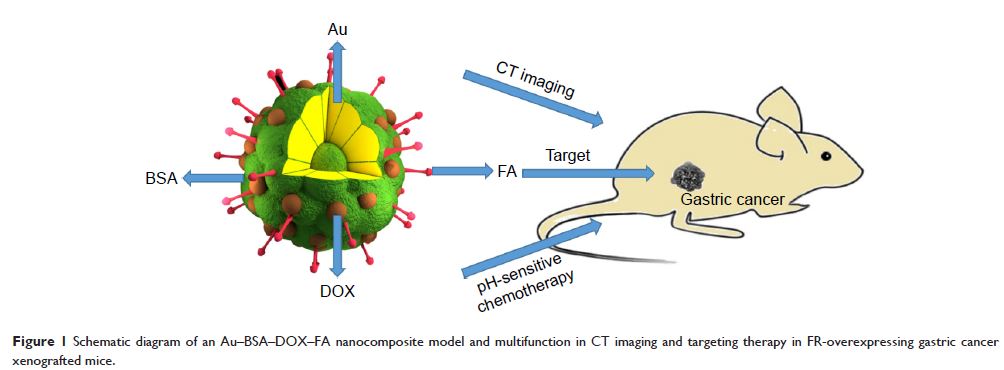109568
论文已发表
注册即可获取德孚的最新动态
IF 收录期刊
- 3.4 Breast Cancer (Dove Med Press)
- 3.2 Clin Epidemiol
- 2.6 Cancer Manag Res
- 2.9 Infect Drug Resist
- 3.7 Clin Interv Aging
- 5.1 Drug Des Dev Ther
- 3.1 Int J Chronic Obstr
- 6.6 Int J Nanomed
- 2.6 Int J Women's Health
- 2.9 Neuropsych Dis Treat
- 2.8 OncoTargets Ther
- 2.0 Patient Prefer Adher
- 2.2 Ther Clin Risk Manag
- 2.5 J Pain Res
- 3.0 Diabet Metab Synd Ob
- 3.2 Psychol Res Behav Ma
- 3.4 Nat Sci Sleep
- 1.8 Pharmgenomics Pers Med
- 2.0 Risk Manag Healthc Policy
- 4.1 J Inflamm Res
- 2.0 Int J Gen Med
- 3.4 J Hepatocell Carcinoma
- 3.0 J Asthma Allergy
- 2.2 Clin Cosmet Investig Dermatol
- 2.4 J Multidiscip Healthc

用于组合 CT 成像和靶向药物递送的 pH 敏感性 Au-BSA-DOX-FA 纳米复合材料
Authors Huang H, Yang D, Liu M, Wang X, Zhang Z, Zhou G, Liu W, Cao Y, Zhang WJ, Wang X
Received 20 November 2016
Accepted for publication 17 February 2017
Published 6 April 2017 Volume 2017:12 Pages 2829—2843
DOI https://doi.org/10.2147/IJN.S128270
Checked for plagiarism Yes
Review by Single-blind
Peer reviewers approved by Dr Colin Mak
Peer reviewer comments 2
Editor who approved publication: Dr Lei Yang
Abstract: Albumin-based nanoparticles (NPs) as a drug delivery system have
attracted much attention owing to their nontoxicity, non-immunogenicity, great
stability and ability to bind to many therapeutic drugs. Herein, bovine serum
albumin (BSA) was utilized as a template to prepare Au–BSA core/shell NPs. The
outer layer BSA was subsequently conjugated with cis-aconityl doxorubicin (DOX)
and folic acid (FA) to create Au–BSA–DOX–FA nanocomposites. A list of
characterizations was undertaken to identify the successful conjugation of drug
molecules and targeted agents. In vitro cytotoxicity using a cell counting
kit-8 (CCK-8) assay indicated that Au–BSA NPs did not display obvious
cytotoxicity to MGC-803 and GES-1 cells in the concentration range of
0–100 µg/mL, which can therefore be used as a safe drug delivery carrier.
Furthermore, compared with free DOX, Au–BSA–DOX–FA nanocomposites exhibited a
pH-sensitive drug release ability and superior antitumor activity in a drug
concentration-dependent manner. In vivo computed tomography (CT) imaging
experiments showed that Au–BSA–DOX–FA nanocomposites could be used as an
efficient and durable CT contrast agent for targeted CT imaging of the folate
receptor (FR) overexpressed in cancer tissues. In vivo antitumor experiments
demonstrated that Au–BSA–DOX–FA nanocomposites have selective antitumor
activity effects on FR-overexpressing tumors and no adverse effects on normal
tissues and organs. In conclusion, the Au–BSA–DOX–FA nanocomposite exhibits
selective targeting activity, X-ray attenuation activity and pH-sensitive drug
release activity. Therefore, it can enhance CT imaging and improve the
targeting therapeutic efficacy of FR-overexpressing gastric cancers. Our
findings suggest that Au–BSA–DOX–FA nanocomposite is a novel drug delivery
carrier and a promising candidate for cancer theranostic applications.
Keywords: gold
nanoparticles, bovine serum albumin, CT imaging, drug delivery, theranostics
